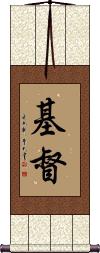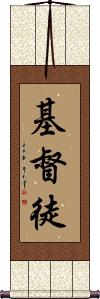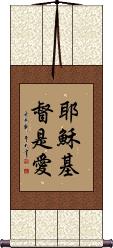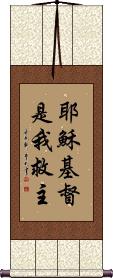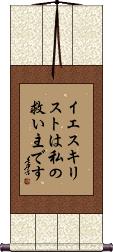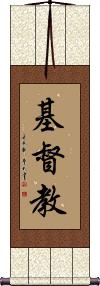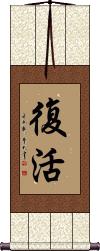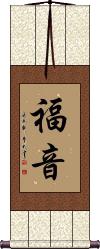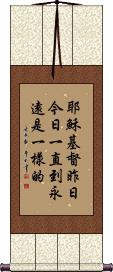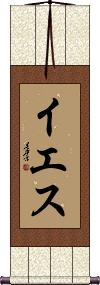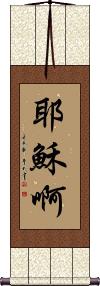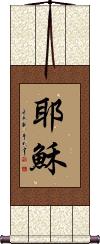Many custom options...
And formats...

Christ in Chinese / Japanese...
Buy a Christ calligraphy wall scroll here!
Personalize your custom “Christ” project by clicking the button next to your favorite “Christ” title below...
1. Christ
2. Christian / Disciple of Christ
4. Jesus Christ
11. Hebrews 13:8
12. Jesus
13. Yeshua
14. Jesus
Christ
基督 is how to write “Christ” in Chinese characters, Korean Hanja, and Japanese Kanji.
This is the word used in the Chinese Union Bible (the only readily-available translation of the Bible into Chinese that I know of - published about 100 years ago). For Chinese Christians, this is the most common way to refer to Jesus Christ.
This is also the way that “Christ” is written in Japanese. But since the Japanese language is very flexible about the sounds that can be assigned to various Kanji, these characters have been assigned a pronunciation that sounds a lot like “Christ” or actually closer to the original “Christos.” In Japanese (if you don't know how the Romaji shown above in the gray box works), it sounds like “key ree sue toe” using English words/sounds. Say those four words fast, and you'll get it.
It should be noted that only Japanese Christians will be familiar with this word.
This is best defined, read, and understood with the characters together, but if you take this word for Christ apart, the first character means “fundamentals” or “foundation.” The second character can mean “leader” or “boss.”
Christian / Disciple of Christ
基督徒 is a very strong and direct word in Chinese for “Christian.”
The literal translation of the first two characters is “Christ.”
The last character means apprentice, follower, or disciple.
Altogether these three characters mean “Christ's Disciple” or “Christ's Apprentice.” 基督徒 is a pretty cool title to hang on your wall if you are a devout Christian.
Also used by Japanese Christians (but may be unfamiliar to non-Christian Japanese people).
See Also: God of Abraham
Jesus Christ is Love
Jesus Christ
Jesus Christ is my Savior
Jesus Christ is My Savior
Disciple of Christianity
基督教徒 is the most verbose (longest) word for “Christian” in the Chinese and Japanese languages.
The literal translation of the first two characters is Christ.
The third Character means “Religion” or “Teaching.”
The last character means “apprentice” or “disciple.”
Altogether these three characters mean “Christ's Teaching Disciple” or “Christ's Religion Apprentice.”
Note: The last two characters are sometimes translated together as “follower (of a religion),” so you could also say it means “Follower of Christ.”
This four-character title makes it very clear what you are talking about in Chinese.
See Also: God of Abraham
Christianity / Christian
基督教 is the Chinese, Japanese and Korean word for “Christianity.”
Just as in English, this word is often used to mean “Protestant” but includes Catholics in the true definition.
It is the word used to refer to the whole “Christian religion” or “Christian Faith,” and therefore, it can be translated as “Christianity.” However, used as an adjective in regard to a person, it would translate as “Christian.” But more like saying, “His religion is Christianity,” rather than a noun form.
If you break it apart, the characters mean Base/Foundation Leading/Supervising Religion/Teaching. It makes more sense in Japanese, Chinese, and Korean. The first two characters together are translated as “Christ.” So you can also say this means “Christ's Religion” or “Christ's Teachings” when directly translated, or in reverse, “The Religion of Christ” or “The Teaching of Christ.”
Notes: The last character has a slight difference in one stroke - however, in calligraphic form, this will not be apparent. This entry can easily be read by any Korean person who knows Hanja characters (Chinese characters used in Korean).
See Also: God of Abraham
Resurrection / Re-Birth
復活 is the Chinese, Japanese and Korean word for resurrection or rebirth.
復活 literally means “return to life.”
It is the term used in most Asian Bibles to refer to the resurrection of Christ. In Japanese, it is sometimes used to mean a Christian Revival. In some contexts, it can mean resuscitation.
See Also: God of Abraham
Word of God / The Gospel
福音 is the Chinese, Korean and Japanese word for “Gospel” or “Word of God.”
福音 is a specifically Christian word in Asia (not used for any other religion).
The first character means blessing, good fortune, or good luck. This first character is a special character used throughout China to bring good tidings and fortune - especially during Chinese New Year. The second character means sound, noise, or news.
Together, these characters create a word that means “The Good News” or “The Sound of Good Fortune.”
When read by a Chinese or Japanese person, this word is always perceived as “The Christian Gospel,” “Word of God,” or even “The Voice of God.”
See Also: God of Abraham
Hebrews 13:8
Jesus
Yeshua
耶稣啊 is the name Yeshua in Chinese (Mandarin).
This is an approximation of the original Hebrew name for “Jesus” transliterated into Chinese.
Note: Christians in China are more likely to say “Christ” (Jidu) which holds more meaning than just sound.
This is very similar to the way Jesus (耶穌) is often written in Chinese, with the addition of 啊 which gives it the final “a” sound.
Jesus
This is simply the name “Jesus” transliterated into Chinese. 耶穌 hold a pronunciation in Mandarin that is closer to the real and original Hebrew Yeshua, instead of the incorrect way we have always pronounced Jesus in English with a hard “J” sound. While this name sounds like the real “Jesus” in Chinese, Christians in China are more likely to say “Christ” (Jidu) which holds more meaning than just sound.
If you are Latino and have been given the name “Jesus,” this is also how to write your name in Chinese.
I've noticed you are searching for "christ". If you are interested, I can have your favorite verse from the Torah or Bible translated into Chinese and written on a wall scroll for you. Please contact me siting the verse or verses you want. Here is an example: Joshua 24:15.
If you are looking for a Jewish or Christian title, phrase, or word, I have a great selection here: Christian Words in Chinese
The following table may be helpful for those studying Chinese or Japanese...
| Title | Characters | Romaji (Romanized Japanese) | Various forms of Romanized Chinese | |
| Christ | 基督 | kirisuto | jī dū / ji1 du1 / ji du / jidu | chi tu / chitu |
| Christian Disciple of Christ | 基督徒 | kirisuto | jī dū tú ji1 du1 tu2 ji du tu jidutu | chi tu t`u chitutu chi tu tu |
| Jesus Christ is Love | 耶穌基督是愛 耶稣基督是爱 | yē sū jī dū shì ài ye1 su1 ji1 du1 shi4 ai4 ye su ji du shi ai yesujidushiai | yeh su chi tu shih ai yehsuchitushihai |
|
| Jesus Christ | 耶穌基督 耶稣基督 | yē sū jī dū ye1 su1 ji1 du1 ye su ji du yesujidu | yeh su chi tu yehsuchitu |
|
| Jesus Christ is my Savior | 耶穌基督是我救主 耶稣基督是我救主 | yē sū jī dū shì wǒ jiù zhǔ ye1 su1 ji1 du1 shi4 wo3 jiu4 zhu3 ye su ji du shi wo jiu zhu yesujidushiwojiuzhu | yeh su chi tu shih wo chiu chu yehsuchitushihwochiuchu |
|
| Jesus Christ is My Savior | イエスキリストは私の救い主です | Iesu kirisuto wa watashi no sukuinushi desu | ||
| Disciple of Christianity | 基督教徒 | kirisutokyouto kirisutokyoto | jī dū jiào tú ji1 du1 jiao4 tu2 ji du jiao tu jidujiaotu | chi tu chiao t`u chituchiaotu chi tu chiao tu |
| Christianity Christian | 基督教 | kirisutokyou kirisutokyo | jī dū jiào ji1 du1 jiao4 ji du jiao jidujiao | chi tu chiao chituchiao |
| Resurrection Re-Birth | 復活 复活 | hukkatsu / hukatsu | fù huó / fu4 huo2 / fu huo / fuhuo | |
| Word of God The Gospel | 福音 | fukuin | fú yīn / fu2 yin1 / fu yin / fuyin | |
| Hebrews 13:8 | 耶穌基督昨日今日一直到永遠是一樣的 耶稣基督昨日今日一直到永远是一样的 | yē sū jī dū zuó rì jīn rì yī zhí dào yǒng yuǎn shì yī yàng de ye1 su1 ji1 du1 zuo2 ri4 jin1 ri4 yi1 zhi2 dao4 yong3 yuan3 shi4 yi1 yang4 de ye su ji du zuo ri jin ri yi zhi dao yong yuan shi yi yang de | yeh su chi tu tso jih chin jih i chih tao yung yüan shih i yang te | |
| Jesus | イエス | iesu | ||
| Yeshua | 耶穌啊 耶稣啊 | yé sū a / ye2 su1 a / ye su a / yesua | yeh su a / yehsua | |
| Jesus | 耶穌 耶稣 | yé sū / ye2 su1 / ye su / yesu | yeh su / yehsu | |
| In some entries above you will see that characters have different versions above and below a line. In these cases, the characters above the line are Traditional Chinese, while the ones below are Simplified Chinese. | ||||
Successful Chinese Character and Japanese Kanji calligraphy searches within the last few hours...
